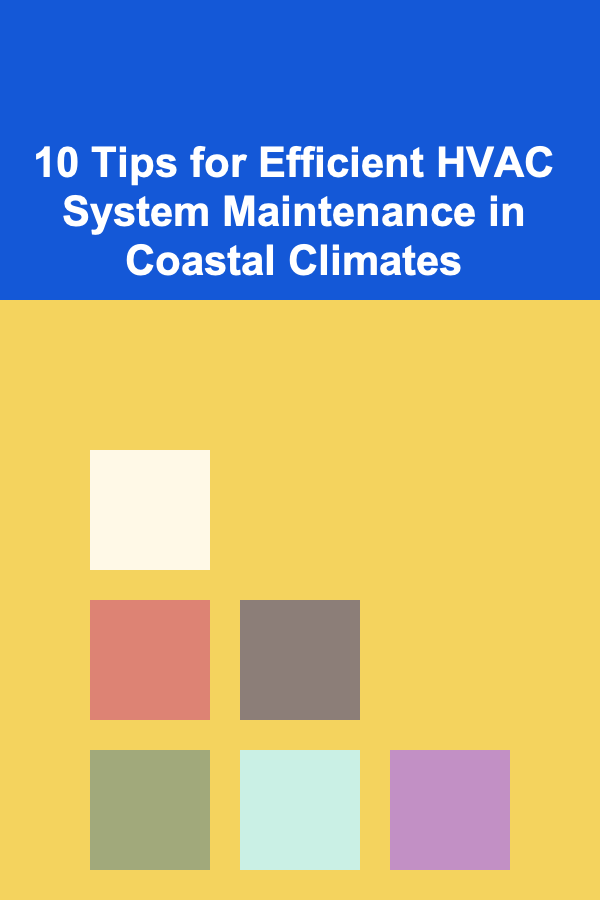
10 Tips for Efficient HVAC System Maintenance in Coastal Climates
ebook include PDF & Audio bundle (Micro Guide)
$12.99$6.99
Limited Time Offer! Order within the next:

Maintaining an HVAC system in a coastal climate presents unique challenges. The combination of salt, humidity, and varying temperatures can accelerate wear and tear on your system. However, with proper care and attention, your HVAC system can continue to run efficiently even in these harsh conditions. In this article, we'll explore ten tips for ensuring that your HVAC system remains reliable and effective in coastal climates, helping to extend its lifespan and improve its performance.
Regularly Clean and Replace Air Filters
One of the most basic but crucial tasks in HVAC maintenance is cleaning or replacing the air filters. Coastal climates, particularly those near the ocean, often experience higher levels of dust, pollen, and sea salt in the air, which can quickly clog filters.
Why It Matters:
- Air Quality: Clogged filters restrict airflow, which can reduce the air quality inside your home.
- System Efficiency: A dirty filter forces the HVAC system to work harder, consuming more energy and reducing overall efficiency.
- Preventing Damage: Regularly changing filters ensures that your HVAC system doesn't overheat or become damaged due to blocked airflow.
Best Practices:
- Frequency: Replace or clean your filters every 1 to 3 months, or more frequently if you live in an area with high pollution or salt air.
- Filter Type: Use high-efficiency filters, such as HEPA filters, to capture fine particulates that are common in coastal environments.
Clean the Coils and Fins
The evaporator and condenser coils play a vital role in heat exchange, but they can quickly become coated with dirt and debris, especially in coastal areas where salt and moisture are prevalent. When these components are dirty, your HVAC system has to work harder to maintain the desired temperature.
Why It Matters:
- Efficiency: Dirty coils make it harder for the HVAC system to cool or heat the air, causing it to use more energy and potentially leading to a system failure.
- Prevention of Rust: Coastal salt can corrode the coils and fins, reducing their lifespan.
Best Practices:
- Frequency: Clean the coils and fins at least once a year, preferably before the start of the cooling or heating season.
- Use a Soft Brush: Gently brush the coils with a soft brush or use a coil cleaner to remove debris. For fins, use a fin comb to straighten any bent fins.
Inspect and Seal Ductwork
In coastal areas, humidity can cause ducts to rust, corrode, or develop leaks. Leaky ducts not only reduce system efficiency but also allow moisture to enter, creating potential problems with mold and mildew growth.
Why It Matters:
- Energy Efficiency: Leaks in ductwork can cause conditioned air to escape, leading to higher energy bills.
- Air Quality: Leaky ducts allow dust, allergens, and contaminants to enter the air you breathe.
Best Practices:
- Inspect Regularly: Have your ducts inspected by a professional at least once every two years to ensure they are properly sealed and insulated.
- Seal Leaks: Use mastic sealant or foil tape to seal any visible leaks in the ductwork.
Ensure Proper Drainage and Moisture Control
Coastal climates tend to have higher humidity levels, which can lead to excess moisture in your HVAC system, particularly in the condensate drain. If the condensate line becomes clogged or obstructed, water can back up and cause damage to the system or even your home.
Why It Matters:
- Prevent Mold and Mildew: Moisture buildup can lead to mold and mildew growth, which can impact air quality and system performance.
- Avoid Water Damage: A clogged drain can lead to water damage to your HVAC unit and surrounding areas.
Best Practices:
- Regular Drain Cleaning: Ensure that the condensate drain is clean and clear. You can flush it with a mixture of water and vinegar to prevent clogs.
- Monitor Moisture: Consider installing a dehumidifier in conjunction with your HVAC system to control humidity levels and prevent moisture damage.
Lubricate Moving Parts
The moving parts of your HVAC system, including the fan, motor, and compressor, require regular lubrication to keep them running smoothly. Coastal climates can accelerate wear and tear due to the increased moisture and salty air.
Why It Matters:
- Reduced Wear: Proper lubrication reduces friction, helping components last longer and operate more efficiently.
- Noise Reduction: Well-lubricated parts typically produce less noise, providing a quieter experience in your home.
Best Practices:
- Lubricate Annually: Lubricate the fan and motor bearings once a year, or more frequently if you notice unusual noises or reduced airflow.
- Use the Right Lubricant: Ensure you're using the appropriate lubricant recommended by your HVAC system's manufacturer.
Protect the Outdoor Unit from Salt and Debris
The outdoor unit of your HVAC system is particularly vulnerable to salt exposure, which can cause corrosion and damage over time. Coastal winds carry saltwater, and it can coat the components of the system, including the condenser coils and fins.
Why It Matters:
- Corrosion Prevention: Salt exposure can lead to rust and corrosion, which can cause the system to fail prematurely.
- Maintaining Efficiency: Salt buildup reduces the efficiency of the heat exchange process, causing your HVAC system to work harder.
Best Practices:
- Clean Regularly: Rinse the outdoor unit periodically with fresh water to remove any salt buildup.
- Install a Protective Cover: When the HVAC system is not in use (such as during the off-season), consider installing a protective cover to shield it from salt and debris.
- Use a Salt Filter: Some systems offer salt filtration options, which can help reduce the amount of salt buildup on your HVAC system.
Check Insulation Regularly
Proper insulation is essential to the efficiency of any HVAC system, especially in coastal climates where moisture can cause insulation to degrade more quickly. Damp insulation can absorb water, reducing its effectiveness and leading to energy inefficiency.
Why It Matters:
- Energy Loss: Poor insulation allows heated or cooled air to escape, making your system work harder to maintain a comfortable temperature.
- Prevent Moisture Buildup: Insulation prevents moisture from seeping into the walls, ducts, or HVAC unit itself.
Best Practices:
- Inspect Insulation: Check for any signs of mold, mildew, or moisture damage to the insulation around your HVAC ducts and system.
- Upgrade Insulation: If necessary, replace damaged insulation with moisture-resistant materials designed for coastal environments.
Schedule Professional Maintenance
While regular DIY maintenance is crucial, scheduling a professional inspection and maintenance service is equally important. HVAC professionals can spot potential issues that may not be visible to the average homeowner.
Why It Matters:
- Expertise: HVAC professionals have the expertise to assess system performance, identify inefficiencies, and perform complex repairs.
- Prevention of Major Problems: Routine professional maintenance helps catch small issues before they develop into expensive repairs.
Best Practices:
- Annual Service: Schedule an annual HVAC check-up before the cooling season begins. This service typically includes coil cleaning, system calibration, and performance checks.
- Ask for Coastal-Specific Advice: Ask the technician to check components that may be more susceptible to salt exposure and humidity, such as the condenser coils, electrical components, and drain lines.
Monitor Temperature and Humidity Levels
Coastal climates can vary greatly in temperature and humidity, which can affect how your HVAC system operates. Humidity can cause the system to work harder, while temperature fluctuations can lead to wear and tear.
Why It Matters:
- Efficiency: Monitoring temperature and humidity levels helps you adjust your HVAC settings for optimal performance.
- Prevent Overworking: By controlling humidity, you can reduce the strain on your air conditioning or heating system.
Best Practices:
- Use a Smart Thermostat: A smart thermostat can automatically adjust the temperature and humidity levels based on environmental conditions.
- Consider Dehumidification: In high-humidity areas, a dehumidifier or a HVAC system with built-in humidity control can help maintain optimal indoor conditions.
Replace Outdated or Inefficient Equipment
Finally, one of the most effective ways to ensure efficient HVAC operation in a coastal climate is by upgrading outdated or inefficient systems. Older units are more susceptible to damage from salt and moisture, and they often require more maintenance to stay functional.
Why It Matters:
- Efficiency: Newer HVAC systems are designed with energy efficiency in mind, reducing the amount of energy required to heat or cool your home.
- Cost Savings: While the upfront cost of a new system may seem high, the long-term savings in energy bills and reduced repair costs can make it a worthwhile investment.
Best Practices:
- Upgrade When Necessary: If your HVAC system is over 10-15 years old, consider upgrading to a more energy-efficient model.
- Choose Coastal-Friendly Units: When purchasing a new system, select one that is specifically designed for use in coastal environments, with features like corrosion-resistant coils and seals.
Conclusion
Efficient HVAC system maintenance in coastal climates requires attention to unique environmental factors such as humidity, salt, and temperature fluctuations. By following these ten tips, you can ensure that your HVAC system remains in peak condition, reducing energy costs, extending the lifespan of the system, and ensuring consistent comfort in your home. Regular maintenance, timely inspections, and appropriate upgrades are key to navigating the challenges posed by coastal living.
Reading More From Our Other Websites
- [Home Party Planning 101] How to Create Signature Drinks for Your Home Party
- [Home Renovating 101] How to Plan a Home Renovation on a Budget
- [Home Rental Property 101] How to Find Reliable Tenants for Your Rental Property
- [Beachcombing Tip 101] The Ultimate Guide to Ethical Beachcombing: Rules for a Sustainable Shoreline
- [Organization Tip 101] How to Organize Your Makeup and Beauty Products
- [Home Party Planning 101] How to Choose the Perfect Theme for Your Next Home Party
- [Home Family Activity 101] How to DIY Sensory Bins for Toddlers: Easy and Affordable Ideas
- [Home Cleaning 101] How to Tackle Pet Hair in Every Corner of Your Home
- [Biking 101] Bike Chain Maintenance: How to Keep Your Chain in Top Condition
- [Home Renovating 101] How to Perform Essential DIY Plumbing Repairs for Toilets and Faucets

How to Integrate Nature into Your Living Space
Read More
How to Organize Virtual Extracurricular Activities
Read More
How to Use Data to Refine and Improve Your Content Strategy
Read More
Renting vs. Buying Comparison: Financial Implications and Long-Term Benefits
Read More
How To Leverage Your Volunteer Experience on Your Resume
Read More
10 Tips for Writing Prompts Centered Around Specific Settings
Read MoreOther Products

How to Integrate Nature into Your Living Space
Read More
How to Organize Virtual Extracurricular Activities
Read More
How to Use Data to Refine and Improve Your Content Strategy
Read More
Renting vs. Buying Comparison: Financial Implications and Long-Term Benefits
Read More
How To Leverage Your Volunteer Experience on Your Resume
Read More